I’m climbing to the top of a mountain in The Legend of Zelda: Breath of the Wild. Why am I climbing this mountain, you ask? Did the story dictate I do so? Is there a quest marker pointing me there, or a collectible to help me fill out a checklist? Is it simply in my way, an obstacle to traverse, as I head towards another required objective? There are a lot of reasons I’m climbing this mountain, but none of those are among them. First, according to my map, it appears there is a lake and some ruins on top, and I want to see what those are. Second, as I climb I can look over my shoulder and soak in the gorgeous sunset from a great viewpoint. Third, climbing is fun. Fourth, mountains are tall, and you can see things from them. In the case of Breath of the Wild, you can see lots of things. Things that could be interesting and worth exploring: towers, shrines, villages, bridges, fields, lakes, ruins, and yes, even more mountains. And the more you see and explore, the more you’re able to prepare for your ultimate goal of defeating Ganon.
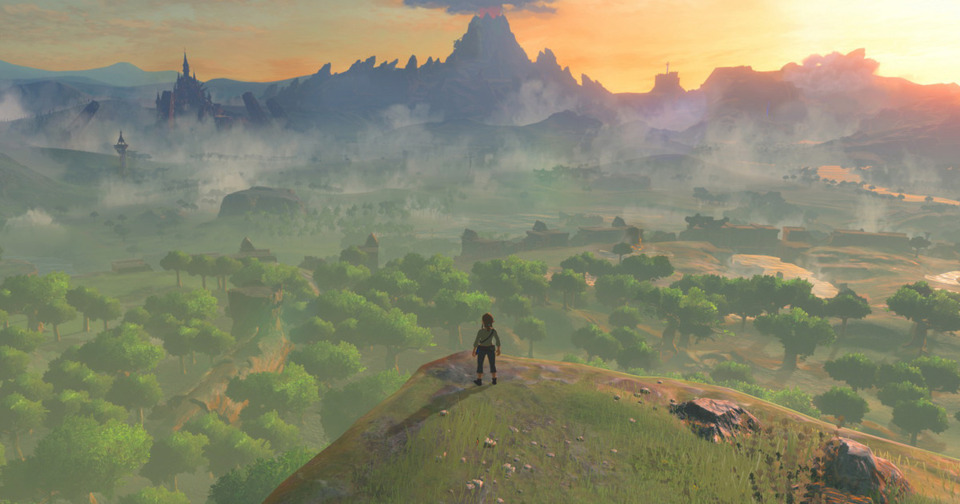
One of the seemingly small, yet brilliant things Breath of the Wild does is give your final, and only, objective right at the start. And then just as critically, it lets you go about tackling that objective in whatever way you see fit. You can try to approach Hyrule Castle from the jump, but that is a Herculean task at best without at least some amount of additional preparation. That’s where the open world comes in, which is littered with seemingly endless, entirely optional, and very interesting things to explore, most of which will help you prepare for your showdown with Ganon. Complete shrine puzzles to increase your health and stamina. Hunt and scavenge to prepare meals that restore health and provide status buffs. Scavenge for korok seeds, rupees, and monster parts to purchase and upgrade your equipment. Fight enemies to practice the combat. Learn about the world and its history to understand what you’re up against, and what may aid you in that fight. Everything you do ultimately feeds into your one goal down the road.
Additionally, everything in this open world is worth engaging with on its own merit. It’s important to emphasize the level of execution here, as exploring Hyrule wouldn’t be fun if the design of this world and its many interacting systems weren’t top-notch. Fortunately in Breath of the Wild, they are. Hyrule is meticulously detailed, unfailingly gorgeous, and full of an impressive variety of highly interesting things to engage with. I could spend thousands of words talking about those interesting things, but for now take my word for it. And more for our purposes, it’s the fact that Breath of the Wild simply lets you dive in and go for it that stands out to me. All of that careful design is engineered to promote our own exploration. Yes, Breath of the Wild gives you one goal to complete, and yes, you can ignore everything else. But that goal creates a purpose, and the rest is simultaneously fun and meaningful with regards to your goal. That’s a potent combination that makes me want to explore; this is neither a frivolous sandbox nor a rote checklist of activities. It’s a highly engaging, dynamic world full of interesting things, and it also makes sense thematically in that you’re preparing for a fight. You have a clear goal up front, but how you go about exploring this world and achieving that goal is entirely up to you. In other words, Breath of the Wild sets the table perfectly for you to play.
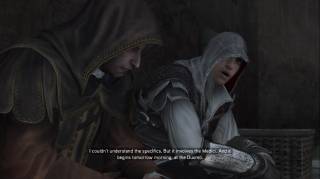
That may sounds silly to say out loud; after all, video games are inherently all about “play,” right? It’s what the entire medium is built upon, as “interactive entertainment,” right? In some ways, sure. On a weirdly definitional level, pretty much all video games involve “play.” But I would argue that plenty of video games don’t really let us play. To give some examples, if you’re clicking through dialogue, is that really “play?” What about a quick-time event? Following a waypoint marker? Selling otherwise useless loot? Managing the rest of your loot? Fighting the same encounter for the dozenth time, where the path to victory is the same as every previous time? Think about how many actions you regularly perform in video games that don’t require much thought on your part, and maybe don’t even require much from an input or execution standpoint either. I’m obviously speaking in broad generalizations, but video games have found plenty of ways over the years to circumvent the need for us to interact with them in any meaningful way. They can be easily digestible “rides” as much as anything, and I’ve often wondered what my role is in the games I’m ostensibly playing. Sometimes I can feel like a passive observer as much as anything, which is not what I’m usually looking for in my favorite pastime.
Don’t get me wrong, I’m not necessarily trying to criticize such things in games. There can be all sorts of reasons to enjoy a video game, and more power to anyone who can, say, watch a twenty minute cutscene and come away satisfied. For me and my preferences, however, I come to video games to play. To actively and meaningfully participate, to make decisions I care about, to explore and engage in interesting mechanics, to discover wondrous things, to learn and hone a skill, and so on. Even better is experiencing new ways to play, even when they’re subtle. Given that, it can be a little tiresome when it feels like games do not push those boundaries, and instead chase more passive experiences. I feel like there was a period within the past decade or two, as we entered the 3D and then HD eras, as graphical technology grew flashier and more powerful, where a lot of games strive to be ever more cinematic, to create something exciting to see, but not always exciting to interact with. Of course there have always been (and likely always will be) games of all kinds, but there was a lot more noise for me to sift through. It was starting to get a little old.
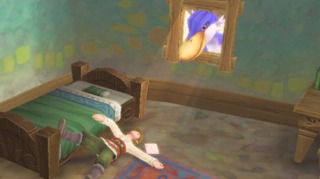
An interesting shift has been happening in recent years, however. I feel like there’s been a resurgence of games that put play first. Going back to Breath of the Wild for a minute, you can more or less see this shift within The Legend of Zelda franchise itself. I would argue that over time, from the original Zelda through Skyward Sword, almost every Zelda game was more passive than the one before it. Skyward Sword came out in 2011, and in many ways represented the culmination of wider design trends from the preceding decade. Like a lot of games of that time, but unlike the early Zelda games, it was a very directed and cinematic experience. Again, that can be fine in ways (Skyward Sword’s other issues aside), but it didn’t leave much room to play. After Skyward Sword though, Nintendo experimented a little with A Link Between Worlds, which released in 2013. Not only did it hearken back to the days of A Link to the Past, which was substantially more active than Skyward Sword, but it also experimented around the periphery even further. It was the most interactive Zelda game in a long time, and set the stage for Breath of the Wild, which is so player-driven that the only Zelda game it bears any possible resemblance to is the 1986 original.
This trend is by no means exclusive to Zelda. Breath of the Wild is simply one of the bigger, more recent, and perhaps more illustrative examples worth elaborating on. But since Skyward Sword came out in 2011, I’ve seen signs of of more “active” games in all sorts of places. Indie games have really taken off over the past so many years, leading to tons of wonderful games that promote play in unique ways. Play-oriented things like rogue-likes and survival games have become almost ubiquitous now, and plenty of games have experimented with ways to incorporate online communities in clever fashion. And of course, there are a chunk of seemingly traditional “big budget” games that have found awesome new ways to promote play. For me, I can look back at my two favorite games from 2016 and see very clear signs that developers are once again embracing play. Just as Breath of the Wild reaches back to rediscover its play-oriented roots, Doom and The Witness hearken back to games from the 1990s that were also very centered around play. The new Doom (almost literally) punches droll exposition to the side whenever it threatens to detract from your play, and The Witness is so hands off it barely gives you direct goals or measures of progress. There's certainly a lot more that goes into both games' successful design, and they ultimately create fun, interesting, and interactive mechanics, scenarios, and spaces, all to say “Just dig in and play.”
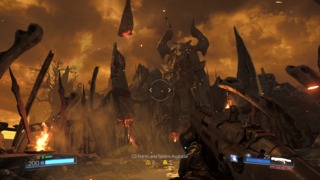
Despite how much these particular games embrace the sensibilities of the past, none of them feel like they are meant to be nostalgic throwbacks either. I’m not someone who thinks that the old stuff was always better, and I’ll be the first to admit that games like Breath of the Wild, Doom, and The Witness employ a lot of worthwhile modern conventions. In fact, what’s perhaps most impressive about them is the way they take that spirit of play that seemed more prevalent in gaming’s earlier days, and have adapted them to modern design sensibilities to achieve the best of both worlds. Breath of the Wild’s generous checkpoints and climbing mechanics encourage you to follow your curiosity without great fear of losing progress. Doom’s clever collectibles and upgrades lend it a rewarding sense of progression and customization that its older versions lacked. The Witness, for all its proposed obtuseness, communicates much more clearly how you interact with the world than, say, Myst ever did. The difference is that they never let their modern concessions stand in the way of your own personal interaction. If anything, these concessions empower you to interact more; they all say “yes” way more than they say “no.” By being less punishing, offering more meaningful upgrade choices, or communicating more clearly, these games create more dynamic ways to play while avoiding additional barriers. The result is that when you are playing games like Breath of the Wild, Doom, or The Witness, you really are playing them every step of the way.
In my friend group, I’ve garnered somewhat of a reputation for being “the gameplay guy” (however you’d define that). They perhaps see me as the hard-nosed purist who puts “gameplay” above all else. I can understand how someone would think that, as I obviously value “play” when it comes to video games. But I’d also argue that the idea of “play” is such a broad and fundamental aspect of the medium that everything else is intrinsically tied to it. In other words, being a “gameplay guy” is akin to being an “everything guy.” Valuing “play” doesn’t mean that I don’t value things like thoughtful stories, smooth pacing, bombastic set pieces, or strong audiovisual presentations in games. I only get frustrated when other aspects impose themselves at the cost of play, which usually means they exist separately from the play experience itself in a sloppy way. For example, I’m the first to roll my eyes when told to play a game “for the story,” because that usually means the “story” and the “game” are separate entities, and that the latter is worse for it. And maybe I’m just an overly ambitious idealist, but I don’t believe these things need to be separate. I think you can have, say, a great story in a game that is also part of the play experience in a positive and meaningful way. Video games are an interactive medium, so I don’t think embracing play needs to rule out anything else. Rather, everything can be assimilated into a rich, multi-faceted, yet cohesive whole, bound together by the very thing that defines and separates video games from other media: play.
That’s why it’s been refreshing for me to see so many games lately rediscover how wonderful play can be. I’m over 40 hours into Breath of the Wild, and I’m just as excited to see more of this world as I was when I started. When I finished Doom, I immediately started the campaign over again, which I almost never feel like doing when I finish a game’s campaign. I didn’t put down The Witness until I had opened every laser box, completed the “final” challenge, and then spent more time still looking for even more puzzles. In each of these cases, the drive was never to complete a checklist or see a quest to its end just so I could move on. I simply enjoyed playing each game, and kept playing until I no longer had a strong desire to play. How that manifests may differ from game to game, but each of these examples embraces play to the fullest. I think this has been happening more and more over the past few years, and it’s been a real treat to see this medium I love rediscover the pure joy of play on which it was built. And just as important, see it realize that a focus on play is not a limitation, but a connective tissue that can empower a seemingly endless variety of interactive experiences.
So why am I climbing this mountain in Breath of the Wild again? The same reason I do everything else in Breath of the Wild: because I want to play.
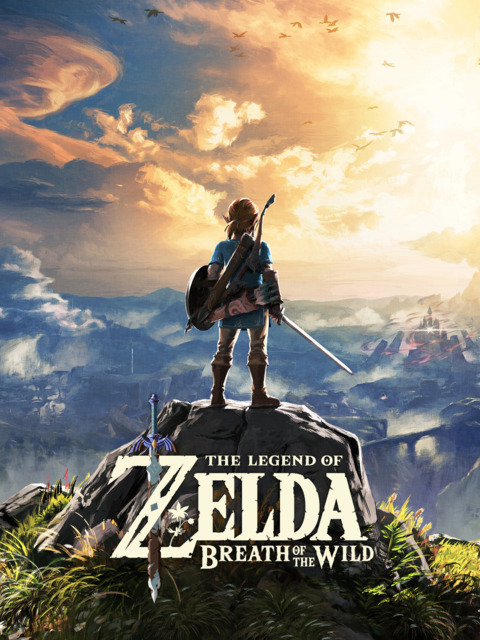
Log in to comment